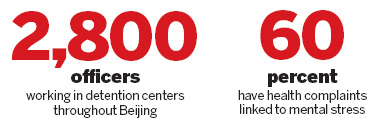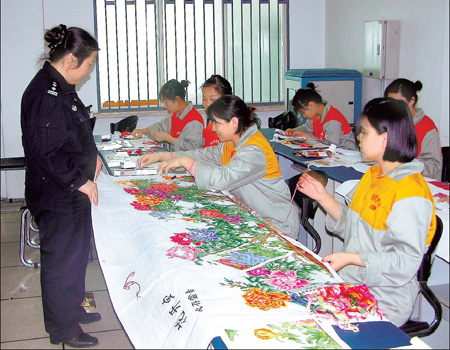Top Stories
Thoughts turn to police officers' mental health
By Wang Wen (China Daily)
Updated: 2010-03-19 08:06
 |
Large Medium Small |
|
Inmates of the Beijing Detention Center learn embroidery as a police officer watches on. COURTESY OF BEIJING DETENTION CENTER |
Pressure of working with detainees causes insomnia, stress
Massive pressure faced by police in the capital's detention centers is damaging officers' mental health, leaving many with insomnia and hypertension and leading senior managers to look for ways to better protect them.
Hypertension is now the most common illness reported by the 2,800 officers working in the centers.
"The officers working at the detention centers are in constant contact with prisoners and their mental health is being affected by the intense work," said Jin Zhihai, commissar of the Detentions Management Department within the Beijing Municipal Public Security Bureau.
About 60 percent of officers at the centers have complained about problems with insomnia and hypertension that can be traced to psychological pressure, Jin said.
In addition to the pressure, they must also work challenging shifts that call for them to be on duty for a 24-hour stretch every four days and eight-hour shifts the rest of the time.
The irregular shifts also cause insomnia, Jin said.

Part of the solution lies in getting more psychological help for the officers, he said.
While they have had sporadic contact with professional psychologists, police officers need more counseling and psychological tools to help them adjust their minds by themselves, said Jin.
"We have paid attention to the physical health of police officers in the past and invited doctors to give lectures about health but we have not done enough about psychological health before," said Jin.
He added that the department has a plan that will be rolled out in May that will see psychologists train police officers, allowing some to gain enough skills to get certification as fully trained consultant psychologists.
"Our aim is to train five police officers to become qualified psychologists in every detention house. There are 40 detention houses in Beijing," Jin told METRO.
He said there are two advantages to training psychologists from within the department: they will be able to help the prisoners with mental health issues and they will also be able to help themselves and their fellow officers.
Wang Guohua, commissar of the Beijing Women's Reeducation Center, which is managed by the Detentions Management Department, is a qualified second-level psychologist - the highest level of psychologist accreditation in China.
She was the first police officer to earn the second-level certification in the department.
"I want to be an inspiration to my colleagues," said Wang. "We really need to be able to understand psychology in order to help the prisoners and help ourselves."
Wang surveyed the psychological state of 18 fellow officers in her center in 2009 and found that all of them were suffering from pressure and stress to some degree because of their work and the closed environment.
One colleague, Cheng Junfeng, a police officer in her 50s who has worked at a detention center in Daxing district for more than 20 years, said detainees are frequently moved and the management of prisoners is a constant challenge.
"I often cannot get to sleep all night long and I'm left feeling tired," Cheng said.
She added that working for two straight days and then taking two days off was a challenge.
The Beijing Women's Federation invited four doctors to the institution earlier this month to speak to officers and offer consultation to individual female staff. They focused on hypertension, gastrointestinal disease, gynecology and nutrition.
"We will collaborate with the department to continue to promote an understanding of psychology in the future," said Li Yanmei, vice-president of the Beijing Women's Federation.








